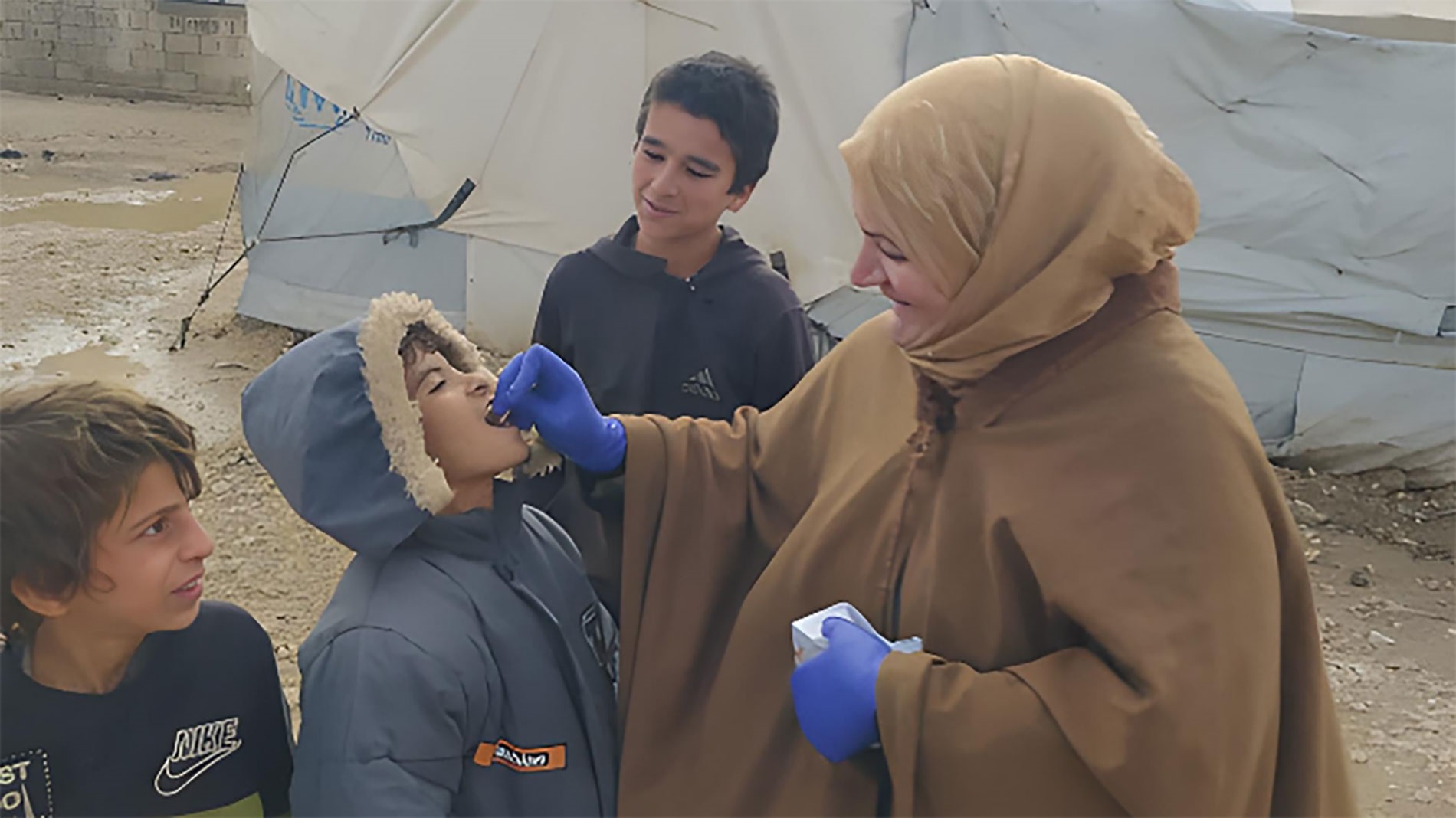/data-and-analytics-(dna)/data-exchange-(dex)/who-presence-in-countries--territories-and-areas.tmb-1920v.jpg?sfvrsn=f1146a2_2)
Rapid cholera vaccination drive contains outbreak in Al-Hol camp in Syrian Arab Republic
Stronger WHO country presence for a healthier and safer world
Joint Outcome 6.1.
Detection of and response to acute public health threats is rapid and effective
In the unforgiving landscape of the north-eastern Syrian Arab Republic, Al-Hol camp shelters nearly 40 000 displaced individuals, the majority of whom are women and children. Overcrowding, inadequate sanitation and limited access to clean water create conditions ripe for disease outbreaks.
In late 2024, cholera emerged as a critical threat, with over 200 suspected cases reported by December, further straining the camp’s fragile health infrastructure. In response, the World Health Organization (WHO) launched a 10-day oral cholera vaccination campaign, in close collaboration with the United Nations Children’s Fund, Gavi, the Vaccine Alliance and local health authorities.
By rapidly mobilizing vaccines from the north-west to the north-east of the country through seamless coordination between WHO’s offices in Gaziantep, Türkiye and Damascus, WHO ensured timely distribution and supported a high-coverage vaccination effort, helping to contain the outbreak and strengthen health resilience in the camp.
WHO’s rapid intervention and coordination
Over 60% of Al-Hol residents are women and children, two groups particularly vulnerable to cholera. Women, who are often responsible for water collection and household hygiene, face high exposure to contaminated sources. Meanwhile, children, with their developing immune systems, are especially susceptible to the disease. Between October and December 2024, over 200 suspected cholera cases, including one fatality, were reported in the camp, necessitating an urgent response. To curb the outbreak, WHO coordinated vaccine distribution and administration, ensuring that doses were rapidly reallocated from the north-west to the north-east of the country. WHO Syrian Arab Republic, in collaboration with its field office in Gaziantep, Türkiye, managed logistics under strict cold-chain protocols to maintain vaccine efficacy.

Outreach volunteer Walaa Mohammed engages Al-Hol camp residents to build trust in the cholera vaccination campaign.
Community engagement and addressing vaccine hesitancy
Risk communication and community engagement (RCCE) played a crucial role in vaccine acceptance. WHO-trained community mobilizers, including local residents, engaged directly with families to dispel misinformation.
Walaa Mohammed, a resident of the camp, joined WHO’s RCCE team to counter vaccine fears and address widespread misinformation about the vaccine. “People were afraid, but I wanted them to understand the vaccine was their best chance to stay healthy,” she said.
Each day she visited families, answering questions, dispelling rumours and offering reassurance, particularly to women, who played a vital role in safeguarding their families. Ziad, a 30-year-old father, initially resisted vaccination, believing cholera mainly affected children.
After health workers explained the risks, Ziad chose to get vaccinated and later became an advocate himself, encouraging others by sharing his own experience. “If I can do it, so can you,” he told his neighbours, helping to build trust across the camp.

A child receives the oral cholera vaccine at Al-Hol camp during the emergency response campaign.
Implementation and impact
Despite harsh winter weather and security constraints, 55 trained personnel, including 40 vaccinators, eight team leaders, two supply officers and five supervisors, worked tirelessly to ensure vaccines reached high-risk areas in the camp. Each day, they vaccinated an average of 2500 people, with children aged 5–15 receiving the majority of the doses. WHO-supported community engagement activities directly reached over 16 500 residents through tent-to-tent visits and dialogues, while flyers and other awareness efforts referred nearly 25 000 people to vaccination points. By 7 January 2025, all 25 336 vaccine doses had been administered, achieving 100% utilization with no wastage.
The outbreak was contained, and no new cholera cases were reported following the campaign. More importantly, the campaign fostered a sense of trust and empowerment within the community. As Walaa reflected, “We showed that, even in the hardest conditions, we can protect each other.”
Key lessons learned
Rapid coordination between WHO offices and partners enabled the timely distribution and administration of vaccines, ensuring an efficient response.
Sustained community engagement is essential for overcoming vaccine hesitancy, particularly in crisis settings.
Integrated surveillance and outbreak response mechanisms strengthened WHO’s ability to respond rapidly, control the outbreak and prevent further transmission.
The successful cholera vaccination campaign in Al-Hol camp underscores the critical importance of timely, coordinated health responses in crisis settings. WHO, in close collaboration with partners and the local community, effectively mitigated the outbreak, demonstrating the power of integrated logistics, targeted community engagement and swift action. The campaign not only contained the cholera threat but strengthened the community’s trust in health interventions, reinforcing the foundation for long-term disease prevention and health resilience in the face of future outbreaks.
